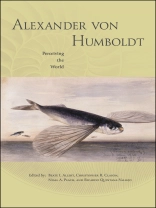Alexander von Humboldt: Perceiving the World provides an interdisciplinary exploration into Humboldt’s approach to seeing and describing the many subjects he pursued. Though remembered primarily as an environmental thinker, Humboldt’s interests were vast and documented not just in his published works, but also in his extensive correspondence with scientists, artists, poets, and philosophers internationally. Perceiving the World covers Humboldt’s perceptions during intercontinental travels and scientific discoveries, as well as how he visualized nature, geography, environments, and diverse cultures, including Indigenous Peoples.
This collection draws heavily on the English translations of Humboldt’s work housed in the Purdue University Archives, which were collected by John Purdue. The book is divided into three parts: Humboldt’s contributions to science since the nineteenth century; his work on nature, climates, environments, and the cosmos; and his lasting cultural impact, including his imaging techniques, modes of visual presentation, and contributions to the arts. Humboldt’s intricate approach to perception still resonates today, as his nuanced and unique way of seeing the world was just as important as what he wrote.
Tabella dei contenuti
Preface
Introduction
PART I: CULTURAL IMPACT
1 Indiana Reads Alexander von Humboldt, by Ricardo Quintana-Vallejo
2 Alexander von Humboldt: Between Enlightenment Vitalism and Romantic
Naturphilosophie, by Peter Hanns Reill
3 Alexander von Humboldt and Peter Schlemihl: The Image of the Scientific Explorer in Early Nineteenth-Century German Literature, by Christopher R. Clason
4 The Meeting of Two Alexanders: Causes and Consequences of Humboldt’s and Pushkin’s Mutual Admiration, by Andrew Kroninger
PART II: ON NATURE AND ENVIRONMENT
5 Alexander von Humboldt’s Environmental Holism, by Melanie Swan
6 Alexander von Humboldt’s Lonely Parrot in
Views of Nature, by Joseph D. Rockelmann 7 Re-Rivering New Spain: Transatlantic Politics of Knowledge and Water in Alexander von Humboldt, by Niall A. Peach
PART III: HUMBOLDT FROM ART TO SCIENCE AND SCIENCE AS ART
8
Beseelte Natur: Alexander von Humboldt and Data-Driven Paradigm Segues, by Ralph M. Kaufmann
9 Alexander von Humboldt beyond Planet Earth: Exploring the Infinite and Unreachable in
Kosmos, by Christina M. Weiler
10 Art and Aesthetics in Alexander von Humboldt: The Subterranean Tree and Other Images, by Beate I. Allert
Biographies of Contributors
Circa l’autore
Ricardo Quintana-Vallejo is assistant professor of English at Rhode Island College. He is the author of Children of Globalization: Diasporic Coming-of-Age Novels in Germany, England, and the United States. He has been a Lynn and Fulbright fellow.












